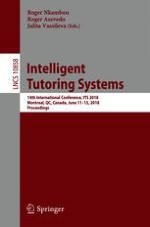2018 | OriginalPaper | Buchkapitel
How Are Students’ Emotions Associated with the Accuracy of Their Note Taking and Summarizing During Learning with ITSs?
verfasst von : Michelle Taub, Nicholas V. Mudrick, Ramkumar Rajendran, Yi Dong, Gautam Biswas, Roger Azevedo
Erschienen in: Intelligent Tutoring Systems
Aktivieren Sie unsere intelligente Suche, um passende Fachinhalte oder Patente zu finden.
Wählen Sie Textabschnitte aus um mit Künstlicher Intelligenz passenden Patente zu finden. powered by
Markieren Sie Textabschnitte, um KI-gestützt weitere passende Inhalte zu finden. powered by
